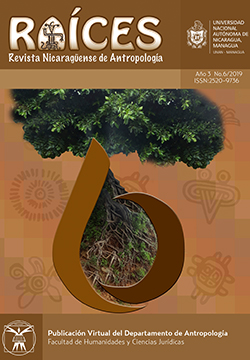Migrate and caring: experiencies of migrant women of Nicaragua and Guatemala
DOI:
https://doi.org/10.5377/raices.v3i6.9011Keywords:
Guatemala, Nicaragua, Social Care, Communication, MigrationsAbstract
Purpose: The care crisis affecting European countries such as Spain has triggered, in the last 10 years, an increase in female migratory flows from Guatemala and Nicaragua, among others. These women migrate to take care of dependent people while leaving their families in their home countries giving rise to so-called transnational families. The objective of this article is to reflect on the strategies that migrants use to maintain the emotional bond with their loved ones, and then continue with their care efforts. Methodology: Based on a qualitative methodology, during the years 2009 to 2016 we conducted in-depth interviews with Guatemalans and Nicaraguans who have migrated to Spain with the aim of working and who are still in communication with their families in their cities of origin. Results: The analysis of the empirical material reflects firstly that Central American women are migrating to Spain to dedicate themselves to home employment and care, secondly that the physical separation of their families is not an impediment to continue their tasks of careful, thirdly, what importance of the new information and communication technologies for the establishment of a relational proximity across borders. Implications: This article aims to contribute new information to the dynamics of Central American women in Spain, which are characterized by being a relatively new migrant collective and therefore, little studied so far.
Downloads
References
Herrera, G. (2011). Cuidados globalizados y desigualdad social. Reflexiones sobre la feminización de la migración andina. Nueva Sociedad 233, pp.87-97.
Hochschild, A. (2001). Las cadenas mundiales de afecto y asistencia y la plusvalía emocional. En En el límite. La vida en el capitalismo global, editado por Anthony Giddens y Will Hutton, 187-208. Barcelona: KriteriosTusquets.
Levitt, P. y Glick-Schiller, N. (2004). Perspectivas internacionales sobre migración: conceptuar la simultaneidad. MigraciónDesarrollo, 3, pp. 60-91.
Martínez-Buján, R. (2009). ¿Y qué pasa con mi cuidadora? Inmigración, servicio doméstico y privatización de los cuidados a las personas dependientes. Zerbitzuan: Gizartezerbitzuetarakoaldizkaria = Revista de servicios sociales, 45:, pp. 99-109.
Melella, C. (2016). El uso de las tecnologías de la información y comunicación (tic) por los migrantes sudamericanos en la argentina y la conformación de redes sociales transnacionales. REMHU, Revista Interdisciplinaria da Mobilidade Humana, 46, pp. 77-90. DOI: http://dx.doi.org/10.1590/1980-
Merla, L. (2014). La circulación de cuidados en las familias trasnacionales. Revista CIDOB dáfersinternacionals, 106-107, pp. 85-104.
Mummert, G. (2019). La segunda madre: La naturalización de la circulación de cuidados entre abuelas y nietos en familias transnacionales latinoamericanas, AIBR, Revista de Antropología Iberoamericana, 14 (3), pp. 515 540. DOI: 10.11156/aibr.140308
Peñaranda, M. (2011). Te escuchas aquí al lado. Usos de las tecnologías de la información y comunicación en contextos migratorios transnacionales. Athenea Digital 19, pp. 239-248. DOI: https://doi.org/10.5565/rev/athenead/v0n19.787
Pérez-Orozco, A. (2005). Perspectivas feministas en torno a la economía: el caso de los cuidados. Tesis doctoral. Universidad Complutense de Madrid.
Rodríguez, L. (2011). Siempre estamos conectados: así sé que me quiere mucho. Comunicaciones en familias transnacionales a través de Internet. Revista Latinoamericana de Estudios de Familia, 3, pp. 50-64.
Rodríguez, V. (2012). Inmigración y cuidados de mayores en la comunidad de Madrid. Bilbao: Fundación BBVA.
Solé, C. y Parella, S. (2006). El papel de las TIC en la configuración de las familias transnacionales. Sistemas, cibernética e informática, 3(1), pp. 7-12.
Yarris, K. (2014). Quiero ir y no quiero ir` (I want to go and I don't want to go): Nicaraguan children's ambivalent experiences of transnational family life. The Journal of Latin American and Caribbean Anthropology, 19(2), pp. 284-309. DOI: 10.1111/jlca.12079




